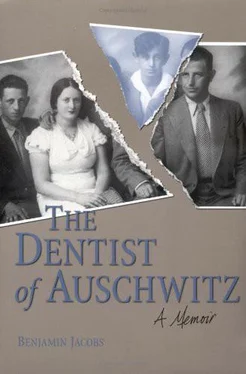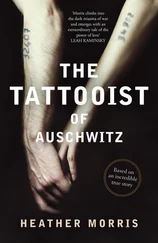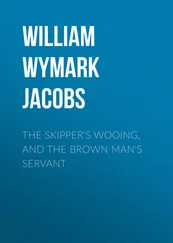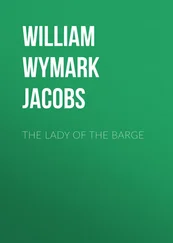Around midnight we all were asleep. When I woke up in the morning I saw sparkling sunshine filtering into a few small windows of the feed storage room where I had slept. Next to me were my brother and Srulek Lipshitz. My head was heavy. Something wasn’t right, I knew. Weighing what had happened last night, I became troubled. I thought about Max. In the past five months, having sole command of us, he could have let us go free. Showing us a prisoner’s number, to make himself seem like us, was particularly distasteful to me. This number, and the fact that his hair was cut short, convinced me that he was strenuously trying to conceal who he really was and wanted to masquerade as a camp survivor. “We cannot allow this,” I thought. I could not stay there another minute.
Ten of us decided to leave immediately. Hermann Josef wanted to come with us. “We ought to turn Max over to the Allies and tell them what role he played in the camps,” I said. Hermann agreed that he was not entirely innocent. Max was nowhere to be found, but his parents were there, and so, suddenly, was Gerta. It was obvious to the Schmidts that something had changed since last night. They knew that we were leaving. It was difficult to part from our brethren with whom we had shared life for several years. We had little gasoline left and thought we would stop and ask soldiers for “petrol,” as the British called it. As we left we were still talking about how we were manipulated by the Schmidts and how Max’s insensitive act was particularly appalling.
Five kilometers to the west we saw an British army depot. We drove in and were immediately stopped at the barrier. We explained in halting English to the two soldiers why we had stopped, but they wouldn’t let us see anybody. They claimed that no one there had authority in such matters and suggested that we see British Army Intelligence. Nonetheless, we succeeded in getting a canister of gasoline for each car, twenty liters’ worth, and also a box of rations. We stopped at two more depots and were told the same thing. None of the British soldiers seemed to take us seriously—as if they did not care. We were baffled and disappointed by them. Since we were not far from Westphalia, Hermann Josef suggested we stop in Lüdenscheid, where a friend of his still lived, he believed. We changed direction.
Every so often we stopped on the road and ate what the British had given us. These were American rations that included canned beef, chocolate, and powdered milk. At eight in the evening we encountered our first Americans close to the town of Münden, not far from Kassel. The road was filled with jeeps and soldiers, some wearing black armbands with the letters MP . They stopped us and told us to move to the side of the road. “Papers?” one of them asked. Eventually, when they saw our tattooed numbers, we managed to get them to understand that we were former prisoners of concentration camps and did not have any papers. “Where are you going?” they wanted to know.
“We are returning home,” Hermann said, which was at least true for him.
“On General Eisenhower’s orders, all travel by civilians is prohibited at night,” they told us. “You’re not allowed to drive between eight at night and seven in the morning.” Hermann thought that we should turn back and drive to Lüdenscheid, which he thought might be occupied by the British. So we began turning back. “Wait!” one MP said. “We have a place for you to stay here, overnight.” We thanked the “officer” (we called everyone officer at first). Among some houses behind the barrier stood a modern two-story house. We could stay there, the MPs said. They also said that there was still food left inside. Unlike the British, they seemed friendly. It did not take us long to find the essentials: enough bread, eggs, sugar, and real Nescafé coffee. It was the first time in five years we were able to cook for ourselves.
Just before we went to bed, we received a visit from a sergeant. First he seemed keenly interested in our experiences. Then he asked if we would lend him one of our automobiles for a couple of hours. We didn’t need it right away, and we readily agreed. “But there isn’t much gasoline in the tank,” we said. Gasoline was a scarce commodity at the time.
“Don’t worry,” he said. “I’ll bring you back all the gasoline you want.” What a wonderful coincidence, we thought. We won’t need to worry about gasoline in the morning. There were enough sofas and beds for everyone, and we had a sense of leisure that was hard to comprehend. To lie down in a real bed under a soft, downy comforter was an unexpected luxury.
The following morning we made two cardboard signs that read “Concentration Camp Inmates” to affix to our automobiles. But the sergeant was not there, and we began to worry. One of his squad quietly assured us that he would be back soon. “He is probably at his Fräulein’s,” the soldier said. The sergeant eventually arrived and signaled that the gasoline was in the trunk. He asked us not to fill our cars there, since that would get him in trouble. We checked, and indeed the cans were full. On the road to Lüdenscheid, we unscrewed one can and began pouring into the tank what we thought was gasoline. It lacked the plop, the odor, and the flow of gasoline. It was ordinary water. We could not believe that a friendly American would swindle us that way.
We were on a busy road in wartime, with some water in the tank, unable to move. For the next hour we tried to stop a passing vehicle until finally a jeep halted with army officers aboard. They gave us a canister of real gasoline. At the same time we learned that Germany had just surrendered. It was May 8. The war in Europe was over.
The engine of our Fiat sputtered and coughed but after a while began to idle. As we drove on toward Lüdenscheid, we once again returned to the British Zone. We arrived at the home of the Happes around midnight. Mr. Happe was stunned to see Hermann and even more so the ten of us with him. In spite of the late hour Frau Happe and served us food, a full meal. We were vigilant and still distrustful of all German people, but the Happes’ hospitality was genuine. There must have been more like them. Where were they? Why were they just bystanders?
Lüdenscheid was a picturesque small town untouched by the ravages of the bitter conflict. It was nestled in a region called Sauerland, with lush green meadows and bountiful soil. A small river, the Volme, wound along the main road to the county seat of Hagen. Not a single house there bore the scars of war. With great fanfare, Mr. Happe introduced us to the town elders, the mayor, and the police chief. Lüdenscheid had had a small number of Jews before the war. Only one survived. The mayor, a former Nazi, made every effort to show that he had liked Jews. He said they missed the Jews who had once lived there and urged us to stay. He also promised to help find us housing and jobs. They all showed great respect for Mr. Happe’s new friends.
Being the first concentration camp survivors in town made us celebrities. My brother and Srulek still wore their striped suits. I had on the navy uniform from the depot at Neustadt. The mayor offered, and we accepted, a complete set of clothing, furnishings, and an apartment. The cinemas in town issued us free passes for life, as did the dramatic theater. Suddenly everyone was our friend. No one, it seemed, had any role in our persecutions, and they all disclaimed their complicity in the Nazi regime. I could not believe that they had come full circle to see us as human again in just a few days.
Seven of our friends left to return to Poland. My brother and Srulek wanted to stay in Lüdenscheid. I was not yet ready to settle there. Hermann wanted to return to Ahlberg, in Bavaria, to his wife and children. When he asked if I would like to come, I accepted his invitation.
Читать дальше












